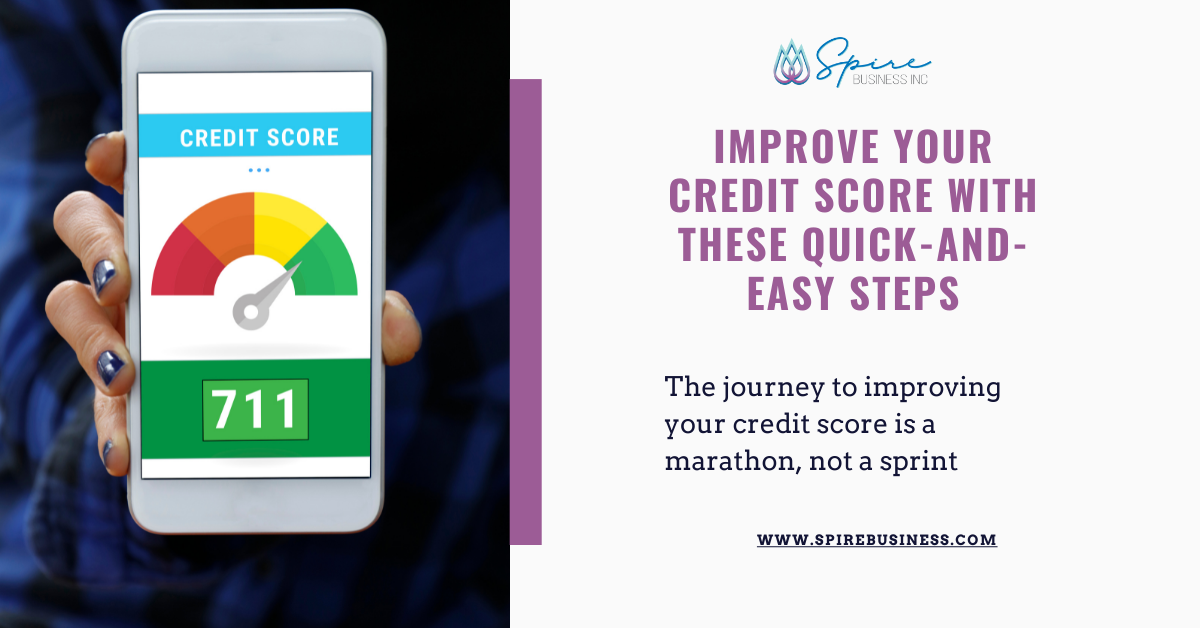As small business owners and entrepreneurs, our credit scores are quintessential to our survival. An excellent score can help you qualify for premium rewards credit cards and low-interest loans, which can be incredibly helpful when growing your business. That said, this is going to be a process, which means it will take time. Patience and focus are key here.
The journey to improving your credit score is a marathon, not a sprint. You can get started by checking your credit score to see where you currently stand. Most credit scores – including the FICO score – operate within the range of 300 to 850. The credit tiers generally look like this:
- Excellent Credit: 750+
- Good Credit: 700-749
- Fair Credit: 650-699
- Poor Credit: 600-649
- Bad Credit: below 600
Once you have an idea of how much room you have to grow, use these tips to begin building better credit:
Stay on top of payments
Keeping track of your debts and keeping them in the green is important – it shows lenders you’re responsible with credit. According to Experian, payment history is the most influential factor for both FICO and VantageScore, which are the most common scoring systems today.
Your credit score is essentially a reflection of your ability to pay back debts effectively. From a lender’s perspective, an established history of timely payments is a good indicator you’ll handle future debts responsibly, too.
Pay your bills on time: delinquent payments, even if only a few days late, and collections can have a significantly negative impact on your FICO Scores. Set reminders on your phone to keep you on track with monthly bill payments. You may also want to consider enrolling in automatic payments through your credit card and loan providers to have payments automatically debited from your bank account.
If you have missed payments, get current and stay current: poor credit performance won’t haunt you forever. The longer you pay your bills on time after being late, the more your FICO Scores should increase. The impact of past credit problems on your FICO Scores fades as time passes and as recent good payment patterns show up on your credit report.
Reduce the amount of debt you owe
Your credit utilization, or the balance of your debt to available credit, contributes 30% to a FICO Score’s calculation. It can be easier to clean up than payment history, but it requires financial discipline and understanding the tips below:
-
- Keep balances low on credit cards and other revolving credit: high outstanding debt can negatively affect a credit score.
- Pay off debt rather than moving it around: the most effective way to improve your credit scores in this area is by paying down your credit card debt. In fact, owing the same amount but having fewer open accounts may lower your scores. Come up with a payment plan that puts most of your payment budget towards the highest interest cards first, while maintaining minimum payments on your other accounts.
- Don’t close unused credit cards as a short-term strategy to raise your scores.
- Don’t open several new credit cards you don’t need to increase your available credit: this approach could backfire and actually lower your credit scores.
Build a Strong Credit Age
If you have a short credit history, there’s not much you can do quickly here to improve your credit. A good average age of credit history would be five years and up. The longer your positive credit history is, the better the credit scores may be. For example, a person with an average credit history of only one year may only have a reflective credit score in the lower 600’s while someone with over five years of good history will be much higher.
Keep in mind that if you have no history at all, it will take an estimated three to six months from the beginning date to see any kind of activity being reported on your credit reports. If you have recently acquired a credit card, you should make small purchases you will be able to pay off by the due date to begin to establish credit and show that you can manage a monthly payment.
—-
Following these tips will not only save you money but also teach you the valuable skills necessary to maintain a good credit score in your future. If you have bad credit, don’t give up on credit entirely. Instead, be responsible and stay educated about your accounts and scores so you can successfully handle your own finances and find a credit repair plan that works well for your situation.
If you’d like to learn more, shoot us an email at hello@spirebusiness.com! We’d love to connect and see how we can support you.
Always in Service,
Linda Brown


